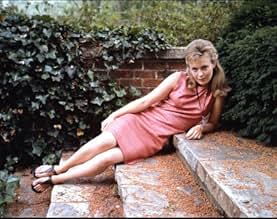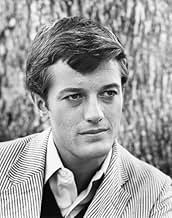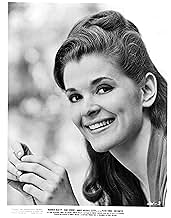IMDb RATING
6.8/10
3.5K
YOUR RATING
A war veteran gets work at a mental institution, where he meets the beautiful and eccentric Lilith.A war veteran gets work at a mental institution, where he meets the beautiful and eccentric Lilith.A war veteran gets work at a mental institution, where he meets the beautiful and eccentric Lilith.
- Director
- Writers
- Stars
- Awards
- 2 nominations total
Walter Arnold
- Lonely Girl's Father
- (uncredited)
Rene Auberjonois
- Howie
- (uncredited)
Elizabeth Bader
- Girl at Bar
- (uncredited)
Ruth Baker
- Patient
- (uncredited)
Janet Banzet
- Patient
- (uncredited)
Amelie Barleon
- Patient
- (uncredited)
Carson Barnes
- Child Crossing Street
- (uncredited)
Jeanne Barr
- Miss Glassman
- (uncredited)
David Barry
- Ambulance Attendant
- (uncredited)
- Director
- Writers
- All cast & crew
- Production, box office & more at IMDbPro
Featured reviews
Robert Rossen would only direct ten films in the space of 17 years and, despite their sometimes erratic quality, he was a talented and highly respected figure. His neglected and misunderstood swan-song was deemed by some a means of reparation for his former Communist beliefs and the fact that he was a friendly witness during the HUAC hearings (the confused hero wanting to make good but ending up disillusioned); when the picture was mauled by critics, he got cold feet and bailed out of his intention to present it at the Venice Film Festival!
Few American movies up to this point had revolved around insane asylums, most notably the prestigious THE SNAKE PIT (1948), Vincente Minnelli's glossy, all-star melodrama THE COBWEB (1955) and the somewhat hysterical SHOCK CORRIDOR (1963) from maverick film-maker Samuel Fuller. Still, this is more of a character study than a serious treatment of its subject matter (which, outside of the inmates played by Jean Seberg and Peter Fonda – a nice early dramatic showcase for the latter – are restricted to a handful of intense irrational outbursts, for lack of a better phrase). Even so, Warren Beatty’s brooding occupational therapist protagonist is himself often impenetrable (despite the sympathetic guidance of asylum head Kim Hunter) – justifying his own breakdown at the film’s abrupt, haunting conclusion. The essential gloominess of the piece is, however, offset by passages of lyricism (the ethereal yet experimental black-and-white cinematography by veteran Eugen Schuftan – who had won as Oscar for Rossen’s previous film, THE HUSTLER [1961] – is exquisite throughout): that said, sequences such as the lengthy interlude at the fair (complete with an archaic jousting tournament) seem to be making some obscure point or other which renders it a slightly pretentious whole.
Apart from the fact that therapist and patient are involved in a tempestuous love affair, the film’s controversial aspects entail scenes subtly depicting paedophelia, a lesbian relationship and also the temptation for an extra-marital fling by Beatty’s former girlfriend (Jessica Walter); a young Gene Hackman appears as Walter’s workaholic but uncouth husband in one scene – naturally, he would re-unite with Beatty for Arthur Penn’s seminal BONNIE AND CLYDE (1967). Despite his classic good looks, Beatty didn’t conform to Hollywood standards – opting from the outset for gritty and often demanding fare (including John Frankenheimer’s ALL FALL DOWN [1962] and Penn’s MICKEY ONE [1965]) whenever he could. The beguiling Seberg exudes effortless sensuality in the role of the enigmatic Lilith which, reportedly, was her own personal favorite; chillingly, the climactic regression into total madness of her character parallels that of the actress herself who would eventually take her own life 15 years later!
Few American movies up to this point had revolved around insane asylums, most notably the prestigious THE SNAKE PIT (1948), Vincente Minnelli's glossy, all-star melodrama THE COBWEB (1955) and the somewhat hysterical SHOCK CORRIDOR (1963) from maverick film-maker Samuel Fuller. Still, this is more of a character study than a serious treatment of its subject matter (which, outside of the inmates played by Jean Seberg and Peter Fonda – a nice early dramatic showcase for the latter – are restricted to a handful of intense irrational outbursts, for lack of a better phrase). Even so, Warren Beatty’s brooding occupational therapist protagonist is himself often impenetrable (despite the sympathetic guidance of asylum head Kim Hunter) – justifying his own breakdown at the film’s abrupt, haunting conclusion. The essential gloominess of the piece is, however, offset by passages of lyricism (the ethereal yet experimental black-and-white cinematography by veteran Eugen Schuftan – who had won as Oscar for Rossen’s previous film, THE HUSTLER [1961] – is exquisite throughout): that said, sequences such as the lengthy interlude at the fair (complete with an archaic jousting tournament) seem to be making some obscure point or other which renders it a slightly pretentious whole.
Apart from the fact that therapist and patient are involved in a tempestuous love affair, the film’s controversial aspects entail scenes subtly depicting paedophelia, a lesbian relationship and also the temptation for an extra-marital fling by Beatty’s former girlfriend (Jessica Walter); a young Gene Hackman appears as Walter’s workaholic but uncouth husband in one scene – naturally, he would re-unite with Beatty for Arthur Penn’s seminal BONNIE AND CLYDE (1967). Despite his classic good looks, Beatty didn’t conform to Hollywood standards – opting from the outset for gritty and often demanding fare (including John Frankenheimer’s ALL FALL DOWN [1962] and Penn’s MICKEY ONE [1965]) whenever he could. The beguiling Seberg exudes effortless sensuality in the role of the enigmatic Lilith which, reportedly, was her own personal favorite; chillingly, the climactic regression into total madness of her character parallels that of the actress herself who would eventually take her own life 15 years later!
This forgotten, totally under-appreciated film from 1964 is very powerful (I believe it was Robert Rossen's last film). Strangely hypnotic and frightening in a very subtle way, this showed Beatty three years before B&C showing the potential he had in Splendor in the Grass. He also met Gene Hackman while making this and later cast him as his brother in B&C which launched Hackman.
There is also a splendid performance from Peter Fonda, of all people. As Hackman's wife, Jessica Walter showed how amazing she was at a relatively young age and just never got the right parts in decent films. You'll also see a young Rene Auberjenois and Olympia Dukakis in a bit part. I hope more people look into this devastating piece on mental illness.
There is also a splendid performance from Peter Fonda, of all people. As Hackman's wife, Jessica Walter showed how amazing she was at a relatively young age and just never got the right parts in decent films. You'll also see a young Rene Auberjenois and Olympia Dukakis in a bit part. I hope more people look into this devastating piece on mental illness.
Jean Seberg was a woefully inadequate actress in almost every role in which she was cast but she seemed born to play Lilith, the unstable, deeply amoral 'heroine' of Robert Rossen's last film. It's an extraordinary performance and it's extraordinary because it doesn't appear to have anything to do with 'acting'; it just seems to exist. The theme of the film is madness, not 'mental illness' but madness in the truly Shakespearean sense of the word, and everything about the film is heightened, a little unreal. Eugen Schufftan photographs the film in a hazy monochrome with the emphasis on white. We peer at the characters through shafts of sunlight, (and there is a lot of water on view, too).
And Seberg isn't the only extraordinary performance. There is excellent work, too, from Warren Beatty as the young nurse drawn into Lilith's web, Kim Hunter as the woman who runs the institution where Lilith is housed and Peter Fonda, (the best of his early performances) as another patient obsessed with Lilith. Indeed the whole cast, (which includes a brilliant, early cameo from Gene Hackman), is working at the top of their form.
The film is an adaptation of a J R Salamanca novel but Rossen renders it in wholly visual terms. He uses his camera the way an artist uses his canvas to convey the inner lives of his characters. It isn't a total success. There are times when it dissolves into hysteria and the symbolism tends to get a bit top-heavy, but it is still a fearless, totally uncommercial movie, possibly it's director's best, and a key American movie of the sixties.
And Seberg isn't the only extraordinary performance. There is excellent work, too, from Warren Beatty as the young nurse drawn into Lilith's web, Kim Hunter as the woman who runs the institution where Lilith is housed and Peter Fonda, (the best of his early performances) as another patient obsessed with Lilith. Indeed the whole cast, (which includes a brilliant, early cameo from Gene Hackman), is working at the top of their form.
The film is an adaptation of a J R Salamanca novel but Rossen renders it in wholly visual terms. He uses his camera the way an artist uses his canvas to convey the inner lives of his characters. It isn't a total success. There are times when it dissolves into hysteria and the symbolism tends to get a bit top-heavy, but it is still a fearless, totally uncommercial movie, possibly it's director's best, and a key American movie of the sixties.
Jean Seberg is absolutely captivating in this film. Yes despite the wig she wears, due to the fact her hair was cropped short for her previous films, she is as lovely as ever. One of my favorite films of all time and certainly the best one that deals with insanity in and honest and true way, not only avoiding the cliché' but completely reversing it and debunking the stereotype. Robert Rossen is a great director, one of history's most under-appreciated and few others could helm this story the way he does. Based on the novel by J.R. Salamanca, the story is of a young war vetern who returns home and seeks a job at the local mental institute. There he gets too involved with several of the patients and learns much about their past, which reflects the tragedy in his own life involving his mother.
It's true Warren Beatty does play the role blandly and stiff. While that's a turn off for many people watching the film, I think they fail to understand that just like Ryan O'Neil in Barry Lyndon, it's the character they're playing. Not the actor and certainly not the direction. Wonderful supporting cast from Kim Hunter and Peter Fonda as well as a brilliant cameo by Gene Hackman, which oozes of a marriage gone sour in his bit part.
It's a very hard film to figure out because so much is left untold and rightfully so leaving the audience to decide what happened. Playing on the fable of the past coming back to haunt us it plays deeply on buried memories and traumatic life experiences that were covered up rather than confronted. There is so much positive to say about this amazing film, but even so it's actress Jean Seberg that is the crown jewell in this picture. Criminally underseen, now that it is on DVD anyone interested in deep character studies should make it a point to watch this ASAP.
It's true Warren Beatty does play the role blandly and stiff. While that's a turn off for many people watching the film, I think they fail to understand that just like Ryan O'Neil in Barry Lyndon, it's the character they're playing. Not the actor and certainly not the direction. Wonderful supporting cast from Kim Hunter and Peter Fonda as well as a brilliant cameo by Gene Hackman, which oozes of a marriage gone sour in his bit part.
It's a very hard film to figure out because so much is left untold and rightfully so leaving the audience to decide what happened. Playing on the fable of the past coming back to haunt us it plays deeply on buried memories and traumatic life experiences that were covered up rather than confronted. There is so much positive to say about this amazing film, but even so it's actress Jean Seberg that is the crown jewell in this picture. Criminally underseen, now that it is on DVD anyone interested in deep character studies should make it a point to watch this ASAP.
The mental institution in this film, called "Poplar Lodge" I believe, is modeled on Chestnut Lodge, a Bethesda, Maryland institution famed for early attempts to establish interpersonal relationships with (rich) psychotic patients. This fits the institutional style depicted in this film. Hopwever, the main characters do not seem to be mentally ill so much as metaphores for the madness es in our society. The perception that sexual expression represents evil or crazy behavior, not changed all that much from the time this film was made, frequent wars, and the way sensitive people are brushed aside as others hustle toward dubious goals, are all personified as forms of madness. Okay so far.
But the film does not quite work. The character played by Anne Meacham, seething with barely suppressed sexuality, works, but Lilith, played as a golden haired all American, girl next door beauty, doing and saying odd things, making up her own language, seeing herself as an outside observer of our society, is a character which doesn't hit home. She seems more quirky than mad. That she drives men into destructive actions seems somehow unlikely. At the most, she may be a catalyst for their weaknesses to be expressed.
Jean Seberg doesn't personify madness. She seems just bemused. Warren Beatty conveys a lack of inner direction, a developing depression, and strange longings by looking blank, seeming inarticulate, and acting as if he has no idea of the direction his next step will take. All of this slows this film down to a very languid pace, frequently accompanied by a relaxed bop-along jazz score. Thus, the film is too slow, a long windup for a soft pitch. It is hard to feel much tension, even though it is clear that there is supposed to be a lot of tension. Nice try, but no cigar.
But the film does not quite work. The character played by Anne Meacham, seething with barely suppressed sexuality, works, but Lilith, played as a golden haired all American, girl next door beauty, doing and saying odd things, making up her own language, seeing herself as an outside observer of our society, is a character which doesn't hit home. She seems more quirky than mad. That she drives men into destructive actions seems somehow unlikely. At the most, she may be a catalyst for their weaknesses to be expressed.
Jean Seberg doesn't personify madness. She seems just bemused. Warren Beatty conveys a lack of inner direction, a developing depression, and strange longings by looking blank, seeming inarticulate, and acting as if he has no idea of the direction his next step will take. All of this slows this film down to a very languid pace, frequently accompanied by a relaxed bop-along jazz score. Thus, the film is too slow, a long windup for a soft pitch. It is hard to feel much tension, even though it is clear that there is supposed to be a lot of tension. Nice try, but no cigar.
Did you know
- TriviaAccording to Kim Hunter: "The tensions on the set contributed to his [Rossen's] death. I don't think I want to talk about it. Since then, Warren has grown so; at that time, he wasn't ready to be a star. He knew it and was scared! In rehearsal, he'd be great. The closer he got to the camera, the more he'd retreat. He'd cut half his lines, which made Warren interesting and the rest of us talky as hell! He gave Jean no help whatsoever. She was damn good in a demanding role. At the wrap party, a group of people threw Warren into a stream".
- GoofsWhen the staff and patients are loading up to go on their picnic, two of the cars are 1955 Cadillac Fleetwood 75's. When they arrive at their destination, the cars have changed into 1958 and 1959 Cadillac Fleetwood 75's. The station wagon has changed from a 1959 Ford Country Squire to a 1960 Ford Country Squire.
- Quotes
Lilith Arthur: If you should discover that your god loved others as much as he loved you, would you hate him for it?
- ConnectionsFeatured in From the Journals of Jean Seberg (1995)
- How long is Lilith?Powered by Alexa
Details
- Release date
- Country of origin
- Language
- Also known as
- Robert Rossen's Lilith
- Filming locations
- Great Falls, Virginia, USA(picnic scenes)
- Production companies
- See more company credits at IMDbPro
Box office
- Gross worldwide
- $542
- Runtime
- 1h 54m(114 min)
- Color
- Aspect ratio
- 1.85 : 1
Contribute to this page
Suggest an edit or add missing content























